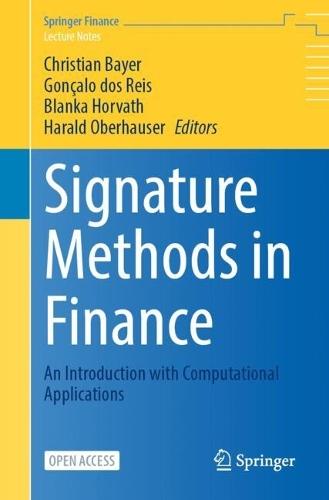Full Product Details
Author: Christian Bayer ,
Goncalo dos Reis ,
Blanka Horvath ,
Harald Oberhauser
Publisher: Springer International Publishing AG
Imprint: Springer International Publishing AG
ISBN: 9783031972386
ISBN 10: 3031972384
Pages: 424
Publication Date: 09 November 2025
Audience:
Professional and scholarly
,
Professional & Vocational
Format: Paperback
Publisher's Status: Active
Availability: Not yet available

This item is yet to be released. You can pre-order this item and we will dispatch it to you upon its release.
Author Information
Christian Bayer is PI of the focus platform Quantitative analysis of stochastic and rough systems within the Weierstrass Institute (in Berlin). His main research interests are financial mathematics and stochastic numerics. One of his major research projects focuses on modelling stock indices like the S&P 500 index (SPX) consistently with respect to the implied volatility surface, and the volatility index (VIX). A specific issue is the behaviour of the implied volatility of options for very short maturities, which is largely believed to exhibit explosion in the form of a power law as maturity goes to zero. And these lead to rough volatility models. The theory of rough paths has many applications in machine learning. He is, in particular, interested in its applications to stochastic optimal control. He uses the path signature to derive efficient numerical approximation methods for stochastic optimal control problems, when the state process is not a Markov process. Gonçalo dos Reis is an Associate Professor at the University of Edinburgh’s School of Mathematics. He received his PhD in Mathematics from the Humboldt University of Berlin and works at the intersection of stochastic analysis, applied probability, and machine learning. His research combines theoretical developments with practical mathematics for industrial applications in finance, engineering, and energy systems. He serves on the editorial boards of several journals, including Energy and AI, and is regularly involved in the curation and dissemination of interdisciplinary research. In 2022, he received the University-wide Best PhD Supervisor of the Year prize in recognition of his mentorship and academic work. His research reflects a sustained engagement with interdisciplinary projects that address both academic and real-world challenges. Blanka Horvath is an associate professor in mathematical and computational finance at the University of Oxford, an associate member of the Oxford-Man Institute and the 2024-25 Emmy Noether Fellow of the LMS. Her research is at the intersection of stochastic analysis and mathematical finance that includes option pricing, forecasting and simulation, with the use of asymptotic, - and numerical methods as well as machine learning techniques. In recent years, Blanka's research focus has been on rough path theory and signature methods, rough volatility models, and generative models. She is convinced of the value of an active dialogue between the financial sector's industry quants and academics. She has multiple ongoing research collaborations with industry partners on cutting-edge technological developments and regular engagements at industry conferences. Blanka is also the inaugural recipient of the Quant Rising Star Award 2020, and a member of the Rising Star Selection Panel ever since. Harald Oberhauser is a Professor in the Mathematical Institute at the University of Oxford, a Tutorial Fellow at St. Hugh's College, and an associate member of the Oxford-Man Institute. He obtained his PhD from the Statslab in the Department of Pure Mathematics and Mathematical Statistics at the University of Cambridge. He held postdoctoral positions in Berlin and Oxford. Harald works on mathematics that allows to better understand, model and make inference about systems that evolve under the influence of randomness. He is especially interested in topics that connect recent progress in theoretical mathematics with real world applications.



